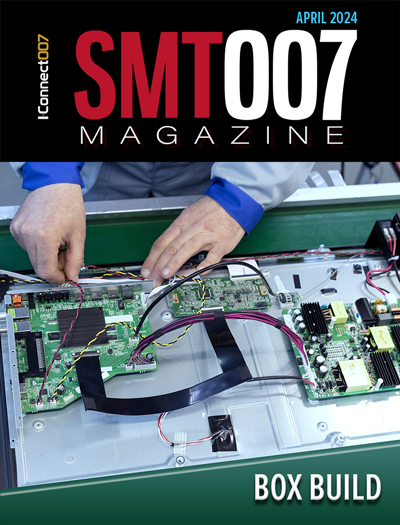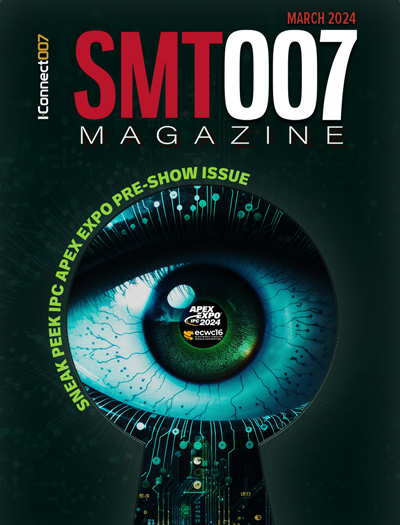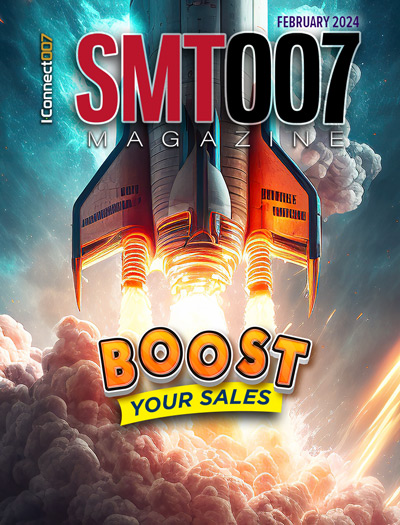-

- News
- Books
Featured Books
- smt007 Magazine
Latest Issues
Current Issue
Box Build
One trend is to add box build and final assembly to your product offering. In this issue, we explore the opportunities and risks of adding system assembly to your service portfolio.

IPC APEX EXPO 2024 Pre-show
This month’s issue devotes its pages to a comprehensive preview of the IPC APEX EXPO 2024 event. Whether your role is technical or business, if you're new-to-the-industry or seasoned veteran, you'll find value throughout this program.

Boost Your Sales
Every part of your business can be evaluated as a process, including your sales funnel. Optimizing your selling process requires a coordinated effort between marketing and sales. In this issue, industry experts in marketing and sales offer their best advice on how to boost your sales efforts.
- Articles
- Columns
Search Console
- Links
- Events
||| MENU - smt007 Magazine
EPTAC: Think Globally, Act Locally
April 12, 2023 | Andy Shaughnessy, Design007 MagazineEstimated reading time: 3 minutes
At the recent Dallas SMTA Expo and Tech Forum, I spoke with many of the 100 exhibitors who dotted the exhibit floor. David Thomas, an IPC master instructor at EPTAC, was running the training company’s booth there. I asked him to update me on EPTAC’s latest efforts and to discuss the value of exhibiting at local events like this one.
Andy Shaughnessy: Nice to meet you, David. Tell me about what EPTAC’s role is here. You live locally, don’t you?
David Thomas: I live in Paris, Texas, so I’m about as local to Dallas as you can get. Right now, EPTAC is working to broaden its our training areas. We held some training in Richardson, Texas, several years ago, but that slacked off, so now we’re trying to reestablish our footing in training here in the Dallas-Fort Worth area, as well as in Houston, San Antonio, Austin, and pretty much anywhere in Texas. This is our first SMTA show in this area in a while. We wanted to see if having a booth would help us draw more interest in this area.
Shaughnessy: Many exhibitors will be at the Houston show in a couple of days. Is EPTAC doing the same thing?
Thomas: I will be at the Houston show and knock on a few doors down there. We want to set up some brick-and-mortar locations, in addition to our onsite trainings. Next week, I’m conducting some training at a neutral location in Florida.
Shaughnessy: What is your expertise?
Thomas: I train to J-STD-001, IPC-A-610, 620, IPC-7711 hand soldering, and the advanced hand soldering that we’re developing right now. I also teach J-STD-001 Space, counterfeit, and electrostatic discharge (ESD). I cover a broad range of topics.
Shaughnessy: I know EPTAC is constantly expanding their services. What’s next?
Thomas: We are growing significantly. We’re currently training at least three new instructors due to demand. Depending on what people want, there are times when it can take two or three months before we can get something arranged on a given subject matter. We’re expanding into skills such as advanced hand soldering, which we need to beef up to meet some of the new requirements, particularly on the smaller component-type items that are out now.
Shaughnessy: There’s a definite need for instruction. Why do you think that’s the case?
Thomas: There are a lot of retirement and other shifts in the workforce. There’s also a lot of development in our training. We conduct training at some big aerospace companies. In California, I’ve trained at an autonomous car company and at U.S. Space Force. As things develop and grow, we’re looking to conduct training at some aeronautics and aerospace equipment companies as well.
Shaughnessy: How long have you been with the company?
Thomas: I’ve been with EPTAC for five years. I’ve been doing their training for more than 12 years, first as an in-house trainer and then on the training side. I left my position as a production manager at a small company in Louisville, Kentucky, and began trainings others on the road.
Shaughnessy: It sounds like you really enjoy your work.
Thomas: I do. Some of our training has changed with COVID and certification requirements. We developed Zoom online training, especially for things like IPC/WHMA-A-620 that doesn’t have a hands-on component. I spend half my time training from my basement. I’ve trained people who are in Hong Kong, Australia, Newfoundland, California, Nebraska, and more. You don’t have to come to us in person. My wife also works for EPTAC. She gets to work upstairs, while I’m in the basement (laughs). But it works great for us.
Shaughnessy: Thanks for speaking with me, David.
Thomas: Thank you, Andy.
Suggested Items
Cicor Records Solid Growth in Q1
04/16/2024 | CicorThe Cicor Group continued to grow in the first three months of the year. Quarterly sales increased by 11.8% to CHF 107.3 million compared to the first quarter of the previous year (Q1/2023: CHF 96.0 million).
TT Electronics Awarded Contract with Kongsberg Defence and Aerospace
04/11/2024 | TT ElectronicsTT Electronics, a leading provider of global manufacturing solutions and engineered technologies, announced today that its Fairford UK business has been awarded a new contract with long-standing customer Kongsberg Defence and Aerospace (Kongsberg) for the production of complex cable harness solutions.
Cicor Successfully Completes Acquisition of TT Electronics IoT Solutions Ltd.
04/03/2024 | CicorThe Cicor Group has successfully completed the acquisition of TT Electronics IoT Solutions Ltd. with three production sites in the UK and China.
Absolute EMS Successfully Recertifies ISO 9001:2015 and AS9100 Standards
03/26/2024 | Absolute EMS, Inc.Absolute EMS, Inc., an award-winning EMS provider of turnkey contract manufacturing services, is proud to announce the successful recertification of its ISO 9001:2015 and AS9100 Rev D SAE International Aerospace Standards.
Arlon EMC Receives IPC-4101 QPL Recertification
03/20/2024 | Arlon Electronic MaterialsArlon Electronic Materials has successfully completed an intensive two-day recertification audit by IPC Validation Services that examined Arlon’s manufacturing processes and testing procedures to assure that they are in conformance to the requirements of IPC-4101E-WAM1, the Specification for Base Materials for Rigid and Multilayer Printed Boards.


